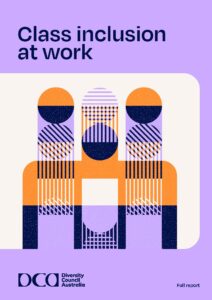 Australia may pride itself on being a land of equal opportunity, but new research from Diversity Council Australia (DCA) reveals that class bias still shapes career opportunities.
Australia may pride itself on being a land of equal opportunity, but new research from Diversity Council Australia (DCA) reveals that class bias still shapes career opportunities.
DCA’s Class Inclusion at Work report, released today (15 October 2025), found that more than half (58%) of HR and diversity practitioners say their organisation prefers candidates from “elite” universities, despite little evidence this leads to better performance. Some reported elite university attendance being used to filter out applications during recruitment.
This biased practice excludes job seekers who are marginalised by their social class (class marginalised) as they are less likely to have attended an elite university than those from middle-class and class privileged backgrounds.
One anonymous consultation participant said they were told they had attended a “country hick” university. Another described a manager dismissing a candidate as being “a bit rough for us,” reflecting bias associated with perceived social background.
DCA CEO Catherine Hunter said these findings are just one part of the Class Inclusion at Work report, which challenges the notion that Australia is a class-free society.
“Your social class shouldn’t determine your career opportunities, yet our research shows class bias still impacts who gets ahead and who is left behind,” Catherine said.
“At a time of rising cost-of-living pressures, skills shortages and economic uncertainty, organisations that allow class to influence hiring not only entrench disadvantage, they risk overlooking valuable talent that can boost productivity and drive recovery.”
Australia’s class reality: key findings from the report
- The class inclusion gap: Class marginalised workers are significantly less likely to experience inclusion at work, with 21% reporting their team is non-inclusive compared to just 5% of their class privileged peers.
- Debunking the ‘class-free’ Australia narrative: Almost two-thirds (63%) of survey respondents disagree that “in Australia, anyone can get a job and do well in their career regardless of their class background,” and just 7% agree Australia is a class-free society.
- Masking class to get ahead: Workers report feeling they had to change how they speak, dress or present themselves, even leaving their school off their CV to “mask” as higher class.
- The price of networks and connections: Nearly eight in ten (79%) class marginalised workers say their social class is a barrier to accessing professional networks, mentors or sponsors.
- Workers want change: Regardless of their class, more than 3 in 4 (79%) respondents agree organisations must take action to address social class exclusion.
Without class inclusion, workplaces risk excluding workers
Further findings from Class Inclusion at Work show a strong case for addressing class inequality. Class marginalised employees who work in inclusive organisations are:
- 5 times more likely to feel work positively impacts their mental health
- 5 times more likely be very satisfied in their job
- more than twice as likely to report access to career development opportunities.
They are also:
- 23 times more likely to say their team is innovative
- 4 times more likely to say their team provides excellent customer service
- more than twice as likely to be willing to work extra hard.
Despite this, class remains one of the most overlooked areas of workplace diversity and inclusion. While 60% of organisations collect some form of class-related data, this is often limited to postcode or education level. Alarmingly, 86% of those who did collect data on class admit it was not being used to inform diversity and inclusion action.
“In 2020, DCA’s Class at Work research placed social class on the workplace inclusion agenda,” said Catherine.
“Five years on, with economic inequality at a 20-year high, class continues to impact people’s lives in profound ways, from access to employment, to pay, career progression and professional networks,”
“This new report gives employers an evidence-based framework to understand and address class inequality in the workplace. By focusing on practical actions across recruitment, development, progression and workplace culture, organisations can unlock talent that is too often overlooked and ensure everyone feels included at work.
“Our hope is that Class Inclusion at Work will spark new conversations about class in Australia and, importantly, inspire workplaces to act so that people from all class backgrounds can thrive and contribute to a more just and equitable nation.”
To find out more, visit DCA’s website. Media can access related imagery via Dropbox.
[ENDS]
About DCA
Diversity Council Australia is the leading peak body for diversity and inclusion. As an independent not-for-profit and charitable organisation, we provide expert guidance to workplaces, policymakers and the broader community through research, tools, events, advocacy and education. Together, with our network of over 1,300 member organisations, we shape more equitable workplaces for a stronger economy and fairer society.
Media Contact
Ali Coulton
media@dca.org.au
